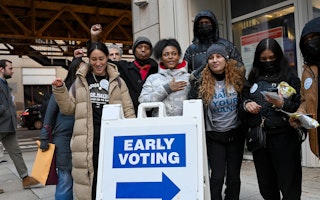How Obama Can Shed Light on Dark Money in Politics
By Lisa Gilbert
A June New York Times/CBS poll brought both hope for campaign finance reformers and confirmation of the challenges reformers face. The poll reflects deep bipartisan support for changes to the way we finance our campaigns and for regulation that would curb the effect of big special-interest money in politics.
By wide margins, respondents said that money plays too big a role in campaigns, and that the wealthy can influence elections more than other Americans. But despite the overwhelming shared sense that our system has a problem, respondents also expressed pessimism that anything will be done to address it—perhaps not surprising given that money in politics, unlike the economy and health care, did not make the list of respondents’ top policy concerns.
It is worth noting the connections between money in politics and the kitchen-table issues voters care about most. Take the fight for an increased minimum wage—an issue voters are addressing directly at the local level with stunning success after years of trying to win incremental increases through state and federal legislation.
Why did past efforts prove so much less successful? The answer lies at least in part with opposition from the U.S. Chamber of Commerce, which spent almost $36 million in the 2014 elections, with another $120 million in 2014 lobbying expenses.
As Deepak Bhargava of the Center for Community Change notes, “The money of corporate interests is dwarfing the voices of not only millions of impoverished Americans, but working and middle-class Americans who can’t afford this type of ‘free speech’” to advance their own interests. Bhargava concludes that a political system unduly influenced by corporate and dark money (spending by organizations that don’t disclose their donors) is intertwined with an economic system that works to the advantage of the one percent at the expense of the rest of us. Without reforms that decrease the influence of big special-interest money on politics, we are unlikely to see the economic reforms that working Americans need.
And what about racial equality? In a joint op-ed for USA Today, Wade Henderson of the Leadership Conference on Civil and Human Rights and Michael Waldman of the Brennan Center note the “particularly toxic toll” dark money takes on poor and minority communities. “We know these communities do not share the policy priorities of the political donor class,” they write. “On issue after issue—from the minimum wage, to paid sick leave, to the regulation of predatory lenders—it is the donor class whose views and priorities win out in the end.”
The explosion of money in politics also makes it harder for communities of color to elect candidates who share their policy preferences, rather than those of special-interest contributors. As Cristobal J. Alex of the Latino Victory Fund wrote in June, “The explosion in money into politics means that the voices of voters are being drowned out, and the best candidates aren’t able to get a fair shot.” As a result, “It is time for the rules to change so that the voters are the ones electing candidates, instead of mega-donors like the Koch brothers.”
The leaders of these diverse movements are issuing a call for action on money in politics, and have identified one easy solution available now that could help put the country on track toward larger reforms. Without Congress, President Obama could take executive action to require that all federal contractors disclose their political giving.
While direct contributions from contractors are prohibited already, the Supreme Court’s ruling in Citizens United opened a huge loophole: federal contractors (and all corporations) can now spend directly from their treasuries to 501(c)(4) and 501(c)(6) organizations, which in turn fund dark money and nominally “independent” expenditures during election season. The proposed executive order would require disclosure of the method these entities have used for political giving most regularly since 2010.
While no one thinks federal contractor disclosure will solve all the nation’s problems, Henderson and Waldman contend that an executive order would improve the lives of poor people and communities of color by ending a “system that rewards big contractors for how well they play this political money game.”
The private prison industry provides an example of how federal contract recipients “have pushed hard for tougher incarceration policies—for both low-level criminals and undocumented immigrants—that increase demand for their product. Their activities have contributed to a culture of mass incarceration whose true costs politicians across the political spectrum are only now starting to acknowledge.”
Disclosure would shed light on special interest use of dark money to line contractor pockets at the community’s expense, and would help make clear the myriad ways that big special-interest money in politics prevents us from addressing the immediate concerns of most Americans—a necessary first step toward broader and more meaningful reforms to our campaign finance system.
Public Citizen is a grantee of the Open Society Foundations.
Lisa Gilbert is director of Public Citizen’s Congress Watch division.


